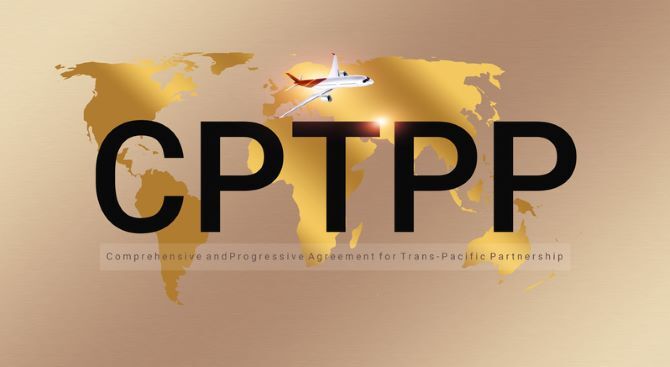Long term hopes as UK signs up to CPTPP
The fact the UK has now formally signed its accession agreement with the 11-nation Comprehensive and Progressive Agreement for Trans-Pacific Partnership (CPTPP) has been welcomed been welcomed by business leaders this week.

 17 July 2023
17 July 2023Although British organisations do not expect any dramatic, immediate economic benefits from joining the group, longer term expectations of being part of a market of 500 million people are high.Sceptics have pointed out that the UK already has trade deals with nine of the 11 original members of the CPTPP - Australia, Canada, Chile, Japan, Mexico, New Zealand, Peru, Singapore and Vietnam - leaving only Brunei and Malaysia with whom Britain does not have a pact.Nevertheless, Miles Celic, CEO of the financial services trade body, TheCityUK, described the UK's accession to the group as "a great achievement".He said: "CPTPP membership gives UK-based firms from across the financial and related professional services industry deeper access to business opportunities in one of the fastest growing regions in the world, including new preferential access to Malaysia, an important CPTPP market with which the UK has no free trade agreement. “It also paves the way for close working and alignment on innovative approaches to digital trade, regulatory cooperation and liberalising trade in services, which will ultimately boost UK exports and drive growth across the country.”
Related reading from Relocate Global
- UK joins 'dynamic' Pacific Rim trade group
- Global trade: the UK’s prospects for new partners
- Education in Japan
The UK's membership of the group is unlikely to become a reality until the second half of 2024, when the deal will have to have been ratified by the legislatures in London and in a majority of the existing 11 member nations.But at the formal signing of the accession agreement in New Zealand last weekend, the UK's Secretary for Business and Trade Kemi Badenoch hailed the deal as a major breakthrough.“We are using our status as an independent trading nation to join an exciting, growing, forward-looking trade bloc, which will help grow the UK economy and build on the hundreds of thousands of jobs CPTPP-owned businesses already support up and down the country,” she said.Ms Badenoch is hoping that by becoming the first European nation to join the CPTPP, the UK will attract further investment in the UK from the Pacific nations, already worth in excess of £182 billion.Marco Forgione, director general of the Institute of Export & International Trade (IOE&IT), said that the UK’s membership was “an incredibly exciting moment”, not just for British businesses but for the wider public, too.“Joining the CPTPP means that the UK has free trade access to rapidly expanding new markets and economies," he said.“For businesses, from small firms to large-scale organisations selling physical goods or services, the agreement represents a new gateway to 500 million customers who they can sell to with far fewer barriers. From whisky to confectionary to cars to jewellery and clothing, the removal of tariffs will make our finest British products more readily available to consumers in the Indo-Pacific bloc.”Henriette Gjaerde, trade and customs stakeholder relationship specialist at IOE&IT, added: “This milestone marks a significant step forward in the UK's global trade strategy, strengthening our relationship with some of the fastest-growing regions in the world. UK businesses will benefit from greater access to the markets of 11 countries, which including the UK as the 12th member account for a combined GDP of £12 trillion.“This agreement can offer numerous opportunities for UK exporters, providing improved market access and reduced tariffs on goods. It can foster new partnerships across the Pacific region. This is a time of opportunity, and we look forward to supporting businesses in maximizing the opportunities this partnership offers.”However, not all trade experts are sounding so optimistic over CPTPP membership. David Henig, director of the UK Trade Policy Project, said overall the benefits would be “modest at best”, and has warned that any “overselling” could have a negative impact on trade policy.He said that the supply chain integration was a useful aspect of the deal but that overall, the economic impact remained “trivial".But William Bain, head of trade policy at the British Chambers of Commerce, was considerably more optimistic, saying membership of the group would open up new opportunities for UK businesses in terms of both inward and external investment.“The UK has bilateral trading terms negotiated with nine of the eleven current members, but no agreements had been reached with Malaysia and Brunei, so the new terms will be of particular interest for traders in these markets," he said.“There are not many multi-national trade agreements like this one, and it offers new prospects in a fast-growing region of the global economy.“We see particular relevance for small and medium-sized businesses in reduced costs to import components from member countries to use in manufactured goods for export. There are also generous terms for data flows, which underpin an increasing part of international trade.“We look forward to working with the UK government, and others, to ensure firms get the best possible access to this thriving market within the global trade system.”
Read about the Innovation Festival for Global Working in the Summer issue of Think Global People magazine and about this year's winners of Relocate and Think Global People Awards in the special supplement. Download your copy here.
Find out more about the Think Global People community.
Subscribe to Relocate Extra, our monthly newsletter, to get all the latest international assignments and global mobility news.Relocate’s new Global Mobility Toolkit provides free information, practical advice and support for HR, global mobility managers and global teams operating overseas.
©2024 Re:locate magazine, published by Profile Locations, Spray Hill, Hastings Road, Lamberhurst, Kent TN3 8JB. All rights reserved. This publication (or any part thereof) may not be reproduced in any form without the prior written permission of Profile Locations. Profile Locations accepts no liability for the accuracy of the contents or any opinions expressed herein.




























